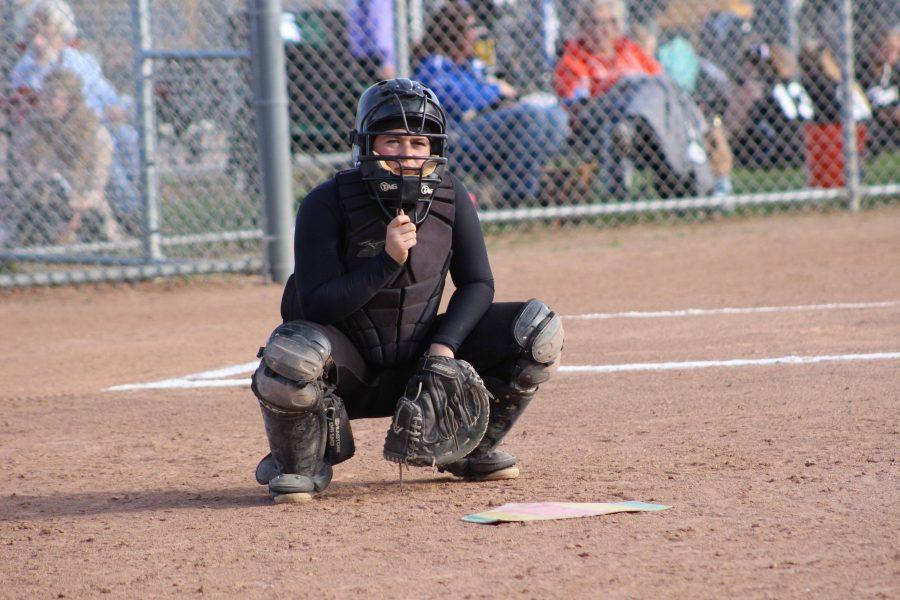Fewer Players Try Out for Softball
Due to homework and busy schedules, students who peviously played said they decided not to join the team in order to focus more on school.
Senior varsity softball player Mary Cianciolo grips her facemask during an away game last season.
The girls softball program has been seeing fewer and fewer players at tryouts the past couple of years. The tryouts for the 2017 season began on March 13, and most players said they expect to have a good season. While there have been enough players to fill three teams- varsity, junior varsity and freshman- in years past, some said it has been harder figuring out positions with limited player options.
“In the past couple of years, numbers have gone down so much at tryouts,” varsity softball player junior Caitlin Moon said. “It went from like 20 to 30 girls trying out for varsity to barely enough to make a team.”
Many student athletes find it difficult to balance sports and academics, which is why some girls do not try out.
“Playing a sport and being in school at the same time is very stressful for a lot of people, so they get overwhelmed and don’t want to play again the next year,” varsity softball player senior Emma Marshall said.
It is a trend among many upperclassmen, especially seniors, to quit playing their sport in order to alleviate stress in their final year before graduating.
“Senior year, people don’t want to play a sport; they don’t want to be overwhelmed,” Marshall said.
Some players felt that more importance is placed on academics, rather than practicing sports. TIME published a study asking students what value they placed on academics on a scale of 1-10. The average response was a 9, indicating that the majority of teens view themselves as students before an athletes.
Busy schedules make it difficult for students to attend practices and games. This is why many students are forced to pick just one activity that they want to pursue after school, which leads many players to opt out of softball.
“With all of the extracurriculars that Troy High offers, there’s less time in the day to schedule practices without missing things like band, orchestra and jobs,” varsity softball player senior Brittany Malaga said.
Sophomore Leya Chambo, who played varsity softball last year, decided not to try out again this year.
“[I’m] stressing about school and a bunch of AP courses and the SAT. It was hard balancing everything,” Chambo said.
Experienced players are leaving, and some said they felt that any new or less experienced players might present the team with small setbacks. Instead of moving forward, returning players may have to cover old plays and techniques again.
“You have to relearn all the plays and drills, so you have to teach the few new kids. We have less time to be learning new things rather than going over old stuff,” Marshall said.
While having fewer players can make some aspects of the season harder, Moon said she feels that good things can come out of this, too.
“I think the players who will end up playing will be more dedicated,” she said.
However, Moon said she also feels that a large team offers a larger support system and a greater opportunity to bond with new people.
“I feel like it’s better to have more people on the team because then there are more people supporting you,” Moon said.
Varsity coach Tom Calnen said he believes this year will show improvements from last year, despite the falling number of players.
“We went through some serious growing pains but I think that it kind of woke everyone else back up. There is a recommitment to understanding what it takes to be successful,” Calnen said.
Some players said they felt that getting girls interested in softball at a younger age would help by the time they reach high school. Longer lasting interest would then lead to more dedication and more girls at tryouts.
“I think if we talk to kids in middle school and younger and get people to start enjoying the sport at a young age then they won’t be nervous to try out in high school,” Moon said.
Malaga and Calnen agreed that the program needs a way to involve more of the youth in the community.
“We need to spread awareness,” Malaga said. “It’s not the most popular sport at Troy High, but if younger kids can learn and think it could be fun then that could help.”
Calnen said he feels that while not a large number of girls try out, those who do are exemplary.
“I have been proud of the program because of the type of kids we have; there is such a huge bar for new players to live up to,” Calnen said.
Your donation will support the student journalists of Troy High School - MI. Your contribution will allow us to print our work, purchase equipment and cover our annual website hosting costs.

